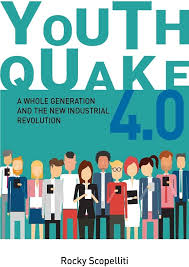
Availability
available
Original Title
Youthquake 4.0
Subject & College
Series
Publish Date
2018-01-01
Published Year
2018
Publisher, Place
Total Pages
232
ISBN 13
978-9814828611
Format
Paperback
Country
Singapure
Language
English
Average Ratings
Readers Feedback
Understanding Industrial Revolutions
Genre and Context Category: Non-fiction, Future Studies, Sociology, and Technology. Publication Date: 2018 Context: Youthquake 4.0 explores the societal and economic transformation brought about by...Read More
Santosh Dagade
Understanding Industrial Revolutions
Genre and Context
Category: Non-fiction, Future Studies, Sociology, and Technology.
Publication Date: 2018
Context: Youthquake 4.0 explores the societal and economic transformation brought about by Millennials and Gen Z as they embrace and redefine the Fourth Industrial Revolution. With advancements in AI, blockchain, and automation shaping industries, the book provides a cultural and generational analysis of how youth influence these shifts and adapt to them.
Initial Impression
I was drawn to Youthquake 4.0 because of its intriguing exploration of the intersection between technology and generational change. As someone interested in the transformative power of digital innovation, I hoped this book would offer fresh insights into how younger generations are driving these changes and shaping the future.
Plot Overview
The book examines the role Millennials and Gen Z play in the Fourth Industrial Revolution, focusing on their attitudes toward technology, work, and societal norms. It investigates how their values, shaped by rapid technological advancement, differ from older generations and how these differences influence global economic and cultural trends.
Themes
• The influence of emerging technologies (e.g., AI, blockchain) on industries and social structures.
• Generational shifts in values, such as sustainability, inclusivity, and innovation.
• The tension between tradition and progress.
• The role of young leaders in redefining capitalism, careers, and consumer behavior.
Setting
The book is set in the global socio-economic context of the Fourth Industrial Revolution, marked by unprecedented technological and cultural change. This setting highlights the interconnectedness of global markets and the digital-first mindset of younger generations.
Characters/Subject
The focus is on Millennials and Gen Z as collective protagonists driving change. Their behaviors, values, and aspirations are dissected to understand their impact on industries, societies, and economies.
Writing Style
Scopelliti’s style is clear and analytical, blending data-driven insights with engaging anecdotes. While it is academic in tone, the inclusion of relatable case studies keeps the content accessible to a broader audience.
Subject Development
The book offers an in-depth exploration of its subject, with strong evidence and research supporting its claims. However, the reliance on statistics occasionally overshadows narrative fluidity.
Practical Applications
The book provides actionable insights for businesses, policymakers, and educators on adapting to generational shifts. It also offers valuable takeaways for young professionals seeking to understand their role in shaping the future.
Themes and Messages
Scopelliti effectively conveys the urgency of embracing innovation and inclusivity in a rapidly changing world. His emphasis on intergenerational understanding and collaboration adds depth to the book’s message.
Emotional Impact
While the book is more analytical than emotional, its optimism about the potential of younger generations to solve pressing global challenges inspires hope and motivation.
Strengths & Weaknesses
Strengths
• Comprehensive analysis of generational values and their impact on global trends.
• Strong research foundation with relevant data and case studies.
• Optimistic and forward-looking perspective.
Weaknesses
• Heavy reliance on statistics may alienate readers seeking a more narrative-driven approach.
• Limited exploration of how older generations can bridge the gap with younger ones.
Connection
As someone who resonates with Millennial values, I found the book’s depiction of generational aspirations relatable and inspiring. Its focus on inclusivity and sustainability aligned with my interests in global development.
Relevance
The book’s exploration of generational dynamics and technological advancement is highly relevant in today’s world, where rapid change demands adaptability from individuals, businesses, and governments alike.
Conclusion
Recommendation
I highly recommend Youthquake 4.0 to anyone interested in technology, generational studies, or the future of work. It is particularly valuable for business leaders, educators, and policymakers who wish to understand and engage with Millennials and Gen Z effectively.
Final Thoughts
“Youth Quake 4.0 ” is a valuable resource for anyone and policymakers seeking to unlock opportunities through developing specific strategies on the interplay between the millennial mind and the fourth industrial revolution.
